All products and services are For Research Use Only and CANNOT be used in the treatment or diagnosis of disease.
Creative Biolabs provides extensive Claudin18.2 CAR-related products, you can choose the appropriate products that you desire for your research project.
Claudin18.2 (CLDN18.2) is an isoform of claudin18 and a member of the tight junction protein family. Its expression is limited in normal tissues, while abnormal expression often occurs in the development of many malignant cancers, such as gastric cancer, colon cancer, breast cancer, liver cancer, and non-small-cell lung cancer. CLDN18.2 is involved in many important biological processes, such as the proliferation, differentiation, and migration of cancer cells. Featured with its specific expression pattern and crucial biological functions, CLDN18.2 has emerged as an attractive therapeutic target for many cancers.
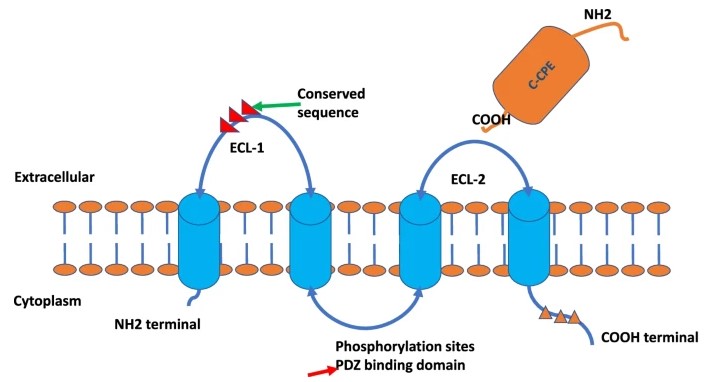
Fig.1 Schematic diagram of the structure of Claudin18.2.1
Associated Diseases
With years of experience in CAR-T fields, Creative Biolabs specializes in providing various robust CAR constructions, such as classical CAR design, armored CAR constructions, etc.

Fig.2 Schematic diagram of Claudin18.2 CAR construction.2
Anti-Claudin18.2 CAR Expression Assay
CAR expression detection is a very important step in CART development, so it is necessary to develop sensitive detection methods. Creative Biolabs has developed extensive CAR detection reagents (e.g., antigen-specific detection reagents, linker-specific detection antibody), as well as comprehensive detection assays to speed CART development.

Fig.3 CAR expression detection of anti-Claudin18.2 CAR-T cells by flow cytometry with representative plots (Left) and MFI percentage (right).2
Anti-Claudin18.2 CAR-T Proliferation Detection
To detect the proliferation ability of CAR-T cells, we have launched various testing services to facilitate global customers' projects, including MTT assay, CCK-8 assay, flow cytometry analysis, and CFSE-based proliferation test, etc.
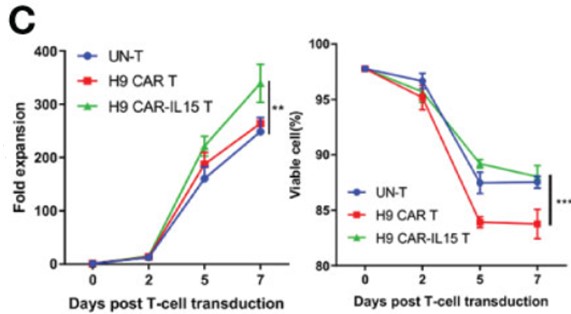
Fig.4 Expansion and viability analysis of anti-Claudin18.2 CAR-T cells.2
Phenotypic Analysis of Anti-Claudin18.2 CAR-T
To characterize the functional performance of CART when co-cultured with target cells, Creative Biolabs offers comprehensive phenotypic analysis services to provide truly translational data. These assays include but are not limited to CART activation test, exhaustion test, T cell subgroup analysis, etc.
T cell Subpopulation Analysis
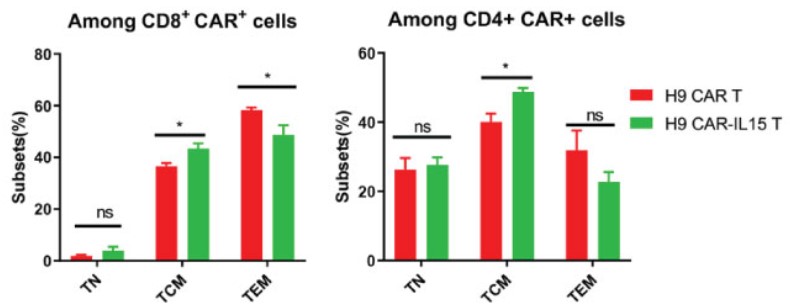
Fig.5 T cell subpopulation (TN, TCM, and TEM) analysis of in the CD8 (left) or CD4 (right) subsets of anti-Claudin18.2 CAR-T cells.2
Exhaustion Test of Anti-Claudin18.2 CAR-T
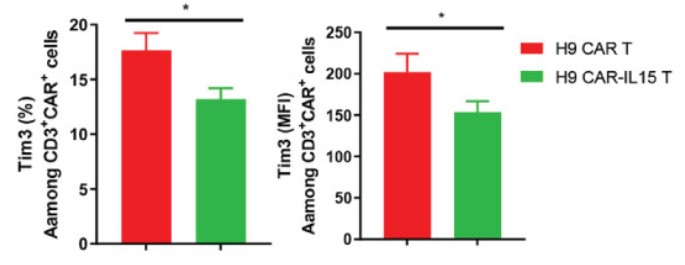
Fig.6 TIM-3 marker expression detection in anti-Claudin18.2 CAR-T cells on Day 7 after transduction.2
Anti-Claudin18.2 CAR-T Cytokine Release Test
Cytokine release test is often used in assessing the target specificity and effectiveness of CAR-T cells against target cells. Creative Biolabs offers various techniques for cytokine tests, such as ELISA, multiplex bead arrays, and intracellular cytokine tests by flow cytometry.
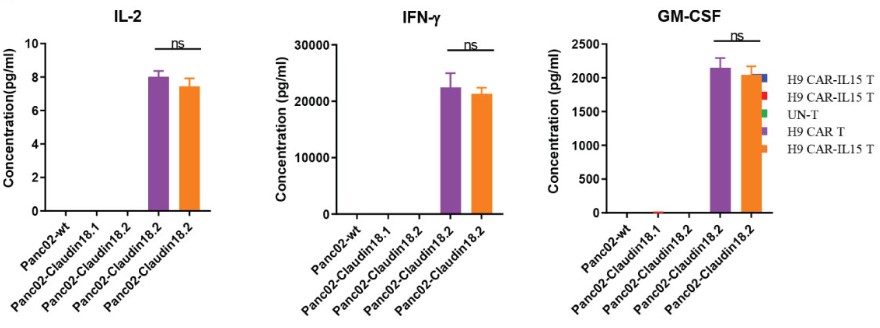
Fig.7 Cytokine (IFN-γ, IL-2, and GM-CSF) analysis of anti-Claudin18.2 CAR-T cells incubated with different tumor cells at indicated E:T ratio.2
Anti-Claudin18.2 CAR-T In Vitro Cytotoxicity Assay
To assess the target specificity and tumor-killing capability of CART cells, Creative Biolabs offers various in vitro cytotoxicity assays for customers to choose from, including chromium (51 chromium) release assays, luciferase-based cytotoxicity tests, flow cytometry-based tests, etc.
In Vitro Cytotoxicity Analysis by Luciferase Assay System

Fig.8 In vitro cytotoxicity analysis of anti-Claudin18.2 CAR-T cells against different target cells at various E:T ratios by luciferase assay system.2
In Vitro Dynamic Killing Assay

Fig.9 In vitro dynamic killing assessment of anti-Claudin18.2 CAR-T cells against different target cells by RTCA assay.2
Selecting and appropriate animal model is crucial for the proof of concept of CAR-T cell function. Creative Biolabs offers a variety of animal models to help you test information about the efficacy, distribution, and proliferation characteristics of CAR T cells in vivo.
Efficacy Test in Panc02-Claudin18.2 CDX model

Fig.10 In vivo efficacy of anti-Claudin18.2 CAR-T in Panc02-Claudin18.2 CDX model. (D) In vivo experimental design. (E) Tumor growth assessment of Panc02-Claudin18.2 CDX model treated with anti-Claudin18.2 CAR-T cells. (F) Tumor growth inhibition statistics of anti-Claudin18.2 CAR-T.2
Efficacy Test in B16F10-Claudin18.2 CDX model

Fig.11 In vivo efficacy of anti-Claudin18.2 CAR-T in B16F10-Claudin18.2 CDX model. (G) In vivo experimental design. (H) Tumor growth assessment of Panc02-Claudin18.2 CDX model treated with anti-Claudin18.2 CAR-T cells. (I) Tumor growth inhibition statistics of anti-Claudin18.2 CAR-T.2
References
 Loading...
Loading...
| CAT | Product Name | Target Species | Antibody Clone | Antibody Host | Receptor Construction | Vector Type | Targeting Cell Type | CAR Vector Type | Inquiry & Datasheet |
| XS-0622-ZP3216 | Anti-Claudin18.2 h(VHH1-VHH2-CD28-CD3ζ) Biepitopic CAR, pCDCAR1 | Human | VHH1-VHH2-CD28-CD3ζ | Lentiviral vector | T Cell | ||||
| XS-0622-ZP3388 | Anti-Claudin18.2 h(VHH1-VHH2-4-1BB-CD3ζ) Biepitopic CAR, pCDCAR1 | VHH1-VHH2-4-1BB-CD3ζ | Lentiviral vector | T Cell | |||||
| XS-1122-LX223 | Anti-Claudin18.2 (X11X223) h(CD28-41BB-CD3ζ) CAR, pCDCAR1 | Human | X11X223 | Mouse | scFv-CD28-41BB-CD3ζ | Lentiviral vector | T cell | ||
| XS-1122-LX224 | Anti-Claudin18.2 (X11X224) h(CD28-41BB-CD3ζ) CAR, pCDCAR1 | Human | X11X224 | Mouse | scFv-CD28-41BB-CD3ζ | Lentiviral vector | T cell | ||
| XS-1122-LX225 | Anti-Claudin18.2 (X11X225) h(CD28-41BB-CD3ζ) CAR, pCDCAR1 | Human | X11X225 | Mouse | scFv-CD28-41BB-CD3ζ | Lentiviral vector | T cell | ||
| XS-1122-LX226 | Anti-Claudin18.2 (X11X226) h(CD28-41BB-CD3ζ) CAR, pCDCAR1 | Human | X11X226 | Mouse | scFv-CD28-41BB-CD3ζ | Lentiviral vector | T cell | ||
| XS-1122-LX227 | Anti-Claudin18.2 (X11X227) h(CD28-41BB-CD3ζ) CAR, pCDCAR1 | Human | X11X227 | Mouse | scFv-CD28-41BB-CD3ζ | Lentiviral vector | T cell | ||
| XS-1122-LX228 | Anti-Claudin18.2 (X11X228) h(CD28-41BB-CD3ζ) CAR, pCDCAR1 | Human | X11X228 | Mouse | scFv-CD28-41BB-CD3ζ | Lentiviral vector | T cell | ||
| XS-1122-LX229 | Anti-Claudin18.2 (X11X229) h(CD28-41BB-CD3ζ) CAR, pCDCAR1 | Human | X11X229 | Mouse | scFv-CD28-41BB-CD3ζ | Lentiviral vector | T cell | ||
| XS-1122-LX230 | Anti-Claudin18.2 (X11X230) h(CD28-41BB-CD3ζ) CAR, pCDCAR1 | Human | X11X230 | Mouse | scFv-CD28-41BB-CD3ζ | Lentiviral vector | T cell | ||
| XS-1122-LX621 | Anti-Claudin18.2 (X11X223) h(CD28-OX40-CD3ζ) CAR, pCDCAR1 | Human | X11X223 | Mouse | scFv-CD28-OX40-CD3ζ | Lentiviral vector | T cell | ||
| XS-1122-LX622 | Anti-Claudin18.2 (X11X224) h(CD28-OX40-CD3ζ) CAR, pCDCAR1 | Human | X11X224 | Mouse | scFv-CD28-OX40-CD3ζ | Lentiviral vector | T cell | ||
| XS-1122-LX623 | Anti-Claudin18.2 (X11X225) h(CD28-OX40-CD3ζ) CAR, pCDCAR1 | Human | X11X225 | Mouse | scFv-CD28-OX40-CD3ζ | Lentiviral vector | T cell | ||
| XS-1122-LX624 | Anti-Claudin18.2 (X11X226) h(CD28-OX40-CD3ζ) CAR, pCDCAR1 | Human | X11X226 | Mouse | scFv-CD28-OX40-CD3ζ | Lentiviral vector | T cell | ||
| XS-1122-LX625 | Anti-Claudin18.2 (X11X227) h(CD28-OX40-CD3ζ) CAR, pCDCAR1 | Human | X11X227 | Mouse | scFv-CD28-OX40-CD3ζ | Lentiviral vector | T cell | ||
| XS-1122-LX626 | Anti-Claudin18.2 (X11X228) h(CD28-OX40-CD3ζ) CAR, pCDCAR1 | Human | X11X228 | Mouse | scFv-CD28-OX40-CD3ζ | Lentiviral vector | T cell | ||
| XS-0123-ZP269 | Anti-Claudin18.2 (CB-P15) h(scFv-CD3ε) TRuC, pCDTRC1 | Human | CB-P15 | Mouse | scFv-CD3ε | Lentiviral vector | T cell | ||
| XS-0123-ZP523 | Anti-Claudin18.2 (CB-P14) h(scFv-CD3ε) TRuC, pCDTRC1 | Mouse | CB-P14 | Rat | scFv-CD3ε | Lentiviral vector | T cell | ||
| XS-0323-ZP269 | Anti-Claudin18.2 (CB-P15 scFv-CD28TM-CD79β) CBCR(CAR-B), pCDCAR1 | Human | CB-P15 | Mouse | scFv-CD28TM-CD79β | Lentiviral vector | T cell | CAR-B Vector | |
| XS-0323-ZP523 | Anti-Claudin18.2 (CB-P14 scFv-CD28TM-CD79β) CBCR(CAR-B), pCDCAR1 | Mouse | CB-P14 | Rat | scFv-CD28TM-CD79β | Lentiviral vector | T cell | CAR-B Vector |
 NEWSLETTER
NEWSLETTER
The latest newsletter to introduce the latest breaking information, our site updates, field and other scientific news, important events, and insights from industry leaders
LEARN MORE NEWSLETTER NEW SOLUTION
NEW SOLUTION
CellRapeutics™ In Vivo Cell Engineering: One-stop in vivo T/B/NK cell and macrophage engineering services covering vectors construction to function verification.
LEARN MORE SOLUTION NOVEL TECHNOLOGY
NOVEL TECHNOLOGY
Silence™ CAR-T Cell: A novel platform to enhance CAR-T cell immunotherapy by combining RNAi technology to suppress genes that may impede CAR functionality.
LEARN MORE NOVEL TECHNOLOGY NEW SOLUTION
NEW SOLUTION
Canine CAR-T Therapy Development: From early target discovery, CAR design and construction, cell culture, and transfection, to in vitro and in vivo function validation.
LEARN MORE SOLUTION